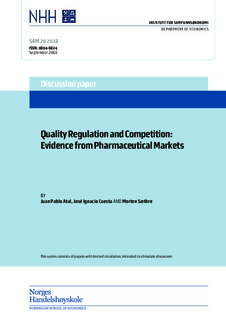| dc.contributor.author | Atal, Juan Pablo | |
| dc.contributor.author | Cuesta, José Ignacio | |
| dc.contributor.author | Sæthre, Morten | |
| dc.date.accessioned | 2018-10-05T13:06:31Z | |
| dc.date.available | 2018-10-05T13:06:31Z | |
| dc.date.issued | 2018-09 | |
| dc.identifier.issn | 0804-6824 | |
| dc.identifier.uri | http://hdl.handle.net/11250/2566705 | |
| dc.description.abstract | We study the effects of quality regulation on market outcomes by exploiting the staggered phase-in of bioequivalence requirements for generic drugs in Chile. We estimate that the number of drugs in the market decreased by 25%, average paid prices increased by 10%, and total sales decreased by 20%. These adverse effects were concentrated among small markets. Our results suggest that the intended effects of quality regulation on price competition through increased (perceived) quality of generics—and therefore reduced vertical differentiation—were overturned by adverse competitive effects arising from the costs of complying with the regulation. | nb_NO |
| dc.language.iso | eng | nb_NO |
| dc.publisher | Institutt for samfunnsøkonomi, NHH | nb_NO |
| dc.relation.ispartofseries | DP SAM;20/2018 | |
| dc.subject | Quality regulation, competition, bioequivalence, generic pharmaceuticals | nb_NO |
| dc.title | Quality Regulation and Competition: Evidence from Pharmaceutical Markets | nb_NO |
| dc.type | Working paper | nb_NO |
| dc.subject.nsi | VDP::Samfunnsvitenskap: 200 | nb_NO |
